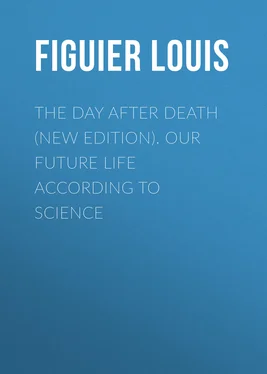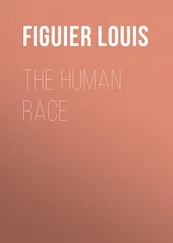Louis Figuier - The Day After Death (New Edition). Our Future Life According to Science
Здесь есть возможность читать онлайн «Louis Figuier - The Day After Death (New Edition). Our Future Life According to Science» — ознакомительный отрывок электронной книги совершенно бесплатно, а после прочтения отрывка купить полную версию. В некоторых случаях можно слушать аудио, скачать через торрент в формате fb2 и присутствует краткое содержание. Жанр: Эзотерика, foreign_religion, foreign_antique, foreign_prose, на английском языке. Описание произведения, (предисловие) а так же отзывы посетителей доступны на портале библиотеки ЛибКат.
- Название:The Day After Death (New Edition). Our Future Life According to Science
- Автор:
- Жанр:
- Год:неизвестен
- ISBN:нет данных
- Рейтинг книги:5 / 5. Голосов: 1
-
Избранное:Добавить в избранное
- Отзывы:
-
Ваша оценка:
- 100
- 1
- 2
- 3
- 4
- 5
The Day After Death (New Edition). Our Future Life According to Science: краткое содержание, описание и аннотация
Предлагаем к чтению аннотацию, описание, краткое содержание или предисловие (зависит от того, что написал сам автор книги «The Day After Death (New Edition). Our Future Life According to Science»). Если вы не нашли необходимую информацию о книге — напишите в комментариях, мы постараемся отыскать её.
The Day After Death (New Edition). Our Future Life According to Science — читать онлайн ознакомительный отрывок
Ниже представлен текст книги, разбитый по страницам. Система сохранения места последней прочитанной страницы, позволяет с удобством читать онлайн бесплатно книгу «The Day After Death (New Edition). Our Future Life According to Science», без необходимости каждый раз заново искать на чём Вы остановились. Поставьте закладку, и сможете в любой момент перейти на страницу, на которой закончили чтение.
Интервал:
Закладка:
These re-incarnations in a human body may be numerous. They must repeat themselves until the faculties of the soul are sufficiently developed, or until its instincts are sufficiently ameliorated and perfected for the man to be raised above the general level of our species. Then only the soul, purified and lightened of all its imperfections, can quit the earth, and after the death of the flesh soar into space, and pass into the new organism which succeeds that of man in the hierarchy of nature.
We must add, here, that the fate of children who die young, either while at the breast or only a few months old, before the soul has undergone any development, is analogous. Their souls pass into the bodies of other children, and re-commence a novel existence.
CHAPTER THE FIFTH
NOTWITHSTANDING the daring of such an attempt, let us now endeavour to form some idea of the radiant creatures which float in the mysterious and sublime regions of that empyrean which hides them from our view. Let us try to discern the attributes, form, and qualities of the superhuman being.
Like the human, the superhuman being possesses the three elements of the aggregate, the body, the soul, and the life. In order to gain some idea of him, we must examine each of these three elements separately.
The Body of the Superhuman Being. —We might perhaps conceive a superhuman being without a body; we might imagine that the soul, purely spiritual, constitutes the blessed dweller in ethereal space. But it is not thus that we do conceive him. Absolute immateriality appears to us to apply only to a being much more elevated in the moral hierarchy than the superhuman one—a being of whom we shall speak hereafter. We believe that the inhabitant of the ethereal spaces has a body; that the soul, leaving its terrestrial dwelling, incarnates itself in a body, as it did here below. But this body must be provided with qualities infinitely superior to those which belong to the human body. First, let us inquire what the form of this body may be. The painters of the Renaissance, whom modern artists follow in this respect, give to the angel the form of a young and handsome man, furnished with white wings, which bear him through the air on his celestial missions. This image is both coarse and poetic. It is poetic because it responds to the idea which we have of the radiant creature who dwells in ethereal space; and it is coarse, because it gives to a being far superior to man the physical attributes of man, which is inadmissible.
Painters who, like Raphael, represent the angel by the head of a child, with wings, give a far more profound expression to the same thought. By suppressing the larger portion of the body, and reducing the seraphic being to the head, the seat of intelligence, they indicate that in the angel of the Christian belief the spiritual dominates, in immense proportion, over the material part.
We shall not be expected to delineate the form of the dwellers in the realms of ether. We can only say, that, as ether is an excessively subtle and rarefied fluid, it necessarily follows that the superhuman being who is to float and fly in its light masses, must be wonderfully light, must be composed of extraordinary subtle substances. A slight material tissue, animated by life, a vaporous, diaphanous drapery of living matter, such do we represent the superhuman being to our fancy.
How is this body supported? Does it need food for its maintenance, like the bodies of men and of animals? We may reply with confidence that food—that tyrannous obligation of the human and the animal species—is spared to the inhabitants of the planetary ether. Their bodies must be supported and refreshed by mere respiration of the fluid in which they exist.
Let us consider the immense space occupied in the lives of animals by their need of alimentation. Many animals, especially those which live in the water, have an incessant need of food. They must eat always, without intermission, or they die of inanition. Among superior animals, the necessity for eating and drinking is less imperious, because the respiratory function comes to their aid, bringing into the body, by the absorption of oxygen and a small proportion of azote, a certain amount of reparative element, as a supplement to alimentary substances. Man profits largely by this advantage. Our respiration is a function of the highest importance, and it bears a great share in the reparation of all our organs. The oxygen which our blood borrows from the air in breathing, contributes largely to our nutrition. The respiratory function in birds is very active, and the organs which exercise it are largely developed, and in their nutrition also oxygen counts largely, and takes the place of a certain quantity of food.
It is our belief that the respiration of the ether in which he lives, suffices for the support of the material body of the superhuman being, and that the necessity for eating and drinking has no place in his existence.
I do not know whether my reader forms an exact conception of the consequences which would result from the theory, that the superhuman beings whom we are contemplating are exempted from all need of food. Those consequences will be most readily comprehended, if we consider that it is the pressing obligation of procuring food which renders the lives of animals so miserable. Forced incessantly to seek their subsistence, animals are entirely given up to this grovelling occupation; thence come their passions, their quarrels, and their sufferings. It is much the same in the case of man, though in a less degree. The necessity for providing for the aliment of every day, the obligation of earning his daily bread—as the popular phrase has it—is the great cause of the labours and the sufferings of the human species. Supposing that man could live, develop himself, and sustain his life without eating—that the mere respiration of air would supply the waste of his organs—what a revolution would be effected in human society. Hateful passions, wars, and rivalries would disappear from the earth. The golden age, dreamed of by the poets, would be the certain consequence of such an organic disposition.
This blessing of nature, refused to man, assuredly belongs to the superhuman being. We may conclude also that the evil passions, which are a sad attribute of our species, would be unknown in the home of these privileged creatures. Released from the toil of seeking their food, living and repairing their functions by the mere effect of respiration—an involuntary and unconscious act (as the circulation of the blood and absorption are unconscious acts in men and animals)—the inhabitants of the ethereal spaces must be able to abandon themselves exclusively to impressions of unmixed happiness and serenity.
The forces of our body become rapidly exhausted; we cannot exercise our functions for a certain time without experiencing fatigue. In order to transport ourselves from one place to another, to carry burthens, to go up or down any height, to walk, we are obliged to expend these forces, and lassitude immediately ensues. We cannot exercise the faculty of thought for more than a certain time. At the end of a short period attention fails, and thought is suspended. In short, our corporeal machine, beautifully ordered, is subject to a thousand derangements, which we call diseases.
From the sense of fatigue, from the continual menace of illness by organic derangement, the dwellers in the ether are free. Rest is not for them, as for us, a necessity ensuing on exercise. The body of the superhuman being, inaccessible to fatigue, does not need repose. Unembarrassed by the mechanism of a complicated machine, it subsists and sustains itself by the unaided force of the life which animates it. Its sole physiological function, probably, is the inhalation of ether, a function which, it is easy to conceive, may be exercised without the aid of numerous organs, if we see a whole class of animals—the Batrachian—for whose respiration the bare and simple skin suffices.
Читать дальшеИнтервал:
Закладка:
Похожие книги на «The Day After Death (New Edition). Our Future Life According to Science»
Представляем Вашему вниманию похожие книги на «The Day After Death (New Edition). Our Future Life According to Science» списком для выбора. Мы отобрали схожую по названию и смыслу литературу в надежде предоставить читателям больше вариантов отыскать новые, интересные, ещё непрочитанные произведения.
Обсуждение, отзывы о книге «The Day After Death (New Edition). Our Future Life According to Science» и просто собственные мнения читателей. Оставьте ваши комментарии, напишите, что Вы думаете о произведении, его смысле или главных героях. Укажите что конкретно понравилось, а что нет, и почему Вы так считаете.












